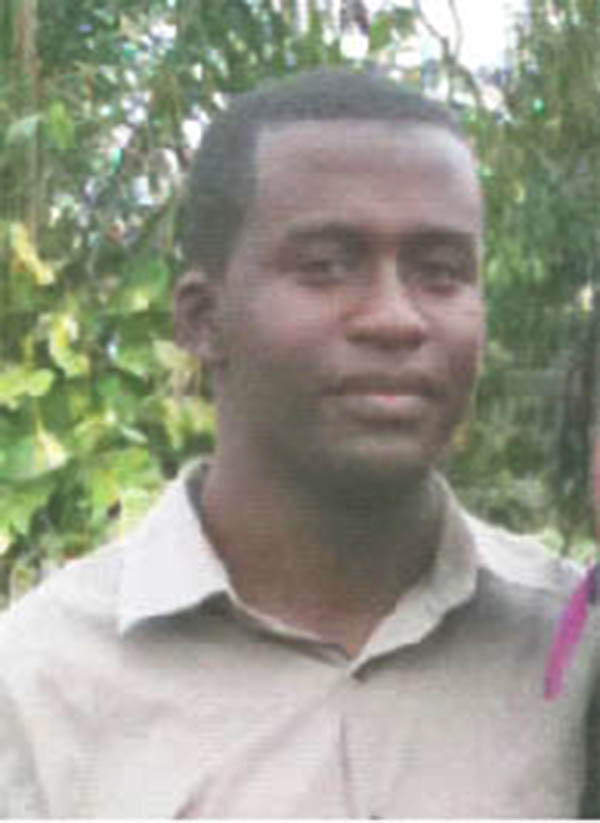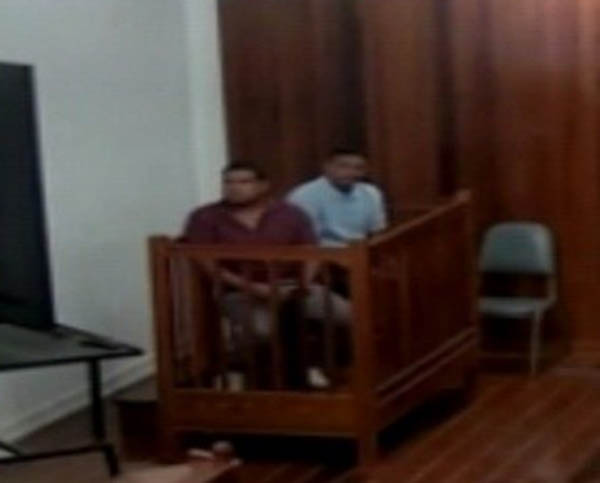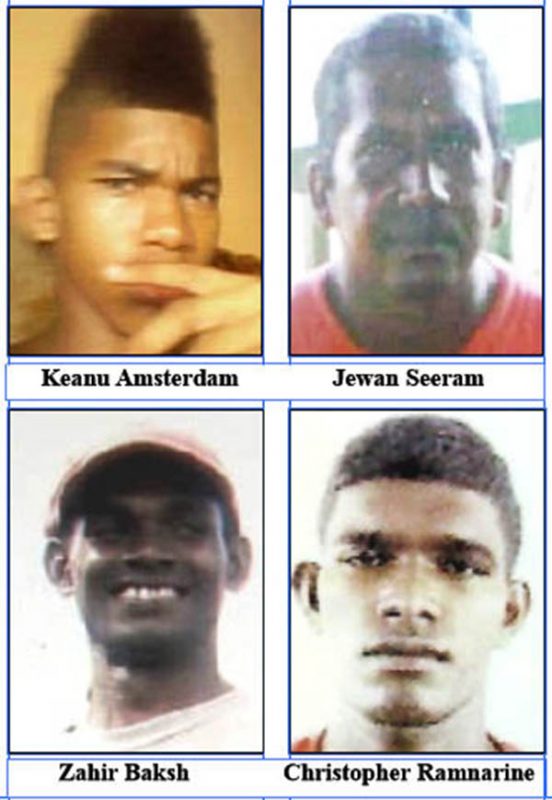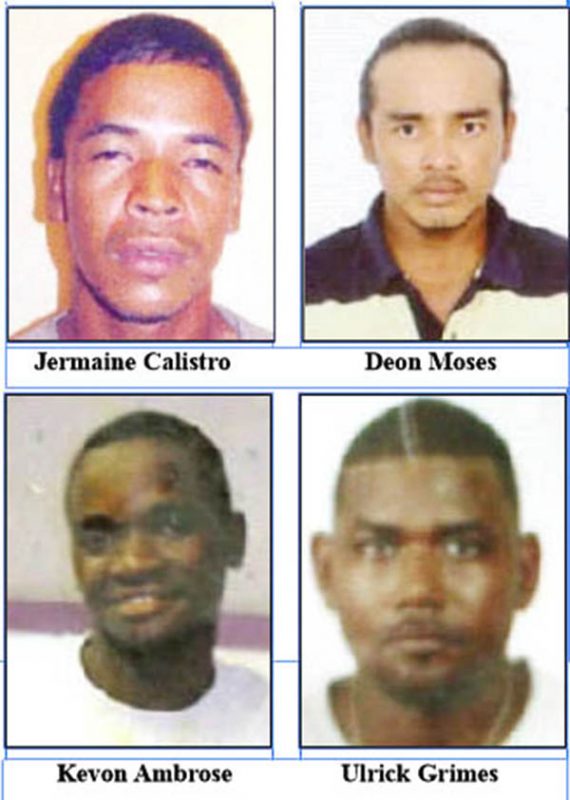A passenger of one of the two boats which collided in the Mazaruni River claiming the lives of 10 persons back in 2013, said that the vessel he was in had been travelling extremely fast.
He testified that even as the captain negotiated the blind turn where the collision occurred at Crab Falls, he had not decreased the speed at which he was piloting the boat all along.
This was the testimony yesterday morning of Brian Archer at the trial of Cabesh Persaud and Devon Thomas who are each facing 10 counts of manslaughter before Justice Simone Morris-Ramlall and a jury at the High Court in Suddie, Essequibo.
Detective Sergeant Kenneth Felix—one of the investigating officers—told the court that Persaud had related to him that he was steering the boat which was outfitted with two 200 horsepower Yamaha engines, at 60 miles per hour.
This pace, the detective said would have been too fast to navigate the particular area at which the collision occurred.
In addition, Felix said that Persaud had revealed to him that he had only been licenced as a bowman, but had no licence to pilot a boat.
The allegation against Persaud called “Dube” and Thomas called “Beast” is that on January 22nd, 2013 in the Mazaruni River, Essequibo, they dangerously steered their boats and unlawfully killed Ricky Bobb, Keanu Amsterdam, Deon Moses, Kevon Ambrose, Christopher Ramnarine, Zahir Baksh, Jewan Seeram, Ulrick Grimes, Jermaine Calistro and Brazilian national Francisco Olivera Alves.
In his response to a question posed by defence attorney Dexter Todd who represents Persaud, Archer said that while he is unfamiliar with river speed, what he can undoubtedly say is that Persaud’s boat in which he was travelling on that fateful day, had been going “very, very speed.”
He said, too, that none of the around a dozen passengers on board were wearing their life jackets at the time of the collision, while pointing out that it was by their own volition that the jackets were not being worn.
He said that when the boat left Parika, everyone was wearing their jackets, but that at different points along the journey to the intended Puruni Landing destination, persons took off their jackets.
In his testimony, the court heard from Felix that after he had put the allegation to Persaud he replied, “meen kill dem people. It was a boat mishap. I was negotiating a blind turn, going at a average of about 60 miles per hour.”
It was in response to a question from the jury foreman that the detective said that 60 miles an hour would have been too fast to have been negotiating such a turn as that where the collision occurred, more so since it was a blind turn.
He said that the accused then went on to tell him that he was a licenced bowman, but had no licence to steer the boat; while adding that he had been operating his boat in accordance with all maritime rules and regulations, but that it was Thomas who had been piloting his boat at a fast rate which collided with his (Persaud’s) boat, the impact from which broke the bow of Persaud’s boat.
In response to a question under cross-examination form attorney Roger Yearwood who represents Thomas, Felix said that Persaud’s revelation of being unlicenced to operate a boat conveyed to him that he was not authorized to pilot a boat.
“I never intended to kill anyone Sir, it was a boat mishap,” Felix said Persaud maintained.
Felix said that the story Persaud related to him was freely and voluntarily given.
Recounting the events of the day in question, Archer told the court that as they approached the turn at Crab Falls, he saw Thomas’ boat which at that time was some 500-600 feet away in the opposite direction.
He told the court that with the nearby island, trees, rocks, and the occasional lowering and elevation of the bow of the boat navigating the current, he was unable to see the other boat all the time, which was made even more difficult from where he was seated in the third row from the bow.
He said he last caught a glimpse of the boat when it was about 200 feet away, before hearing another passenger exclaim and mere seconds after hearing a loud explosion, at which point he realized that the two boats had collided.
He told Todd when asked that he could not say which boat had collided with which, as he did not see what happened at that time, but had only heard the impact. Archer said that what he does recall, however, is that the boat he was in was travelling extremely fast.
Also testifying yesterday was retired Detective Inspector of Police Garfield Headley who recalled both captains of the ill-fated vessels reporting the collision to the Bartica Police Station and informing that they were unable to account for 10 passengers.
He said that he immediately assembled a party of policemen and they travelled out to the scene of the collision where upon arrival he noticed the partially sunken boat which was operated by Thomas.
He said that a rescue boat was already there with some persons who were trying to salvage the wreckage. At that time he said that all the survivors had already been taken to shore and that only Calistro’s body was recovered at that point.
He said that both the stern and the bow of that boat had been badly damaged.
Headley said that back at the station he put the allegation to Thomas of recklessly piloting his boat and causing the collision with Persaud’s boat.
The Inspector said that Thomas then replied, “officer, ah gon tell yuh wah happen and you gon write it down.”
At that point Justice Morris-Ramlall informed that the court would be conducting a voir dire in the matter.
When the trial commenced on Tuesday, Police witnesses testified that Persaud and Thomas contended that they should not be held culpable for the loss of lives because the incident was a “mishap.”
The court had also heard from a number of other police officers of the recovery of the 10 bodies in the days following the collision, as well as from emotional relatives who recalled identifying their loved ones to the pathologist for autopsies.
The collision which claimed the lives of the 10 is said to have occurred at about 12:30 on the night in question at Crab Falls; between the Dube and Mattrani, in the Mazaruni River.
The Dube which was heading to Puruni was helmed by Persaud, while the Mattrani which was destined for Parika was steered by Thomas.
In her opening address to the jury on Tuesday, Prosecutor Tiffini Lyken said that those who perished were all passengers of the Mattrani.









